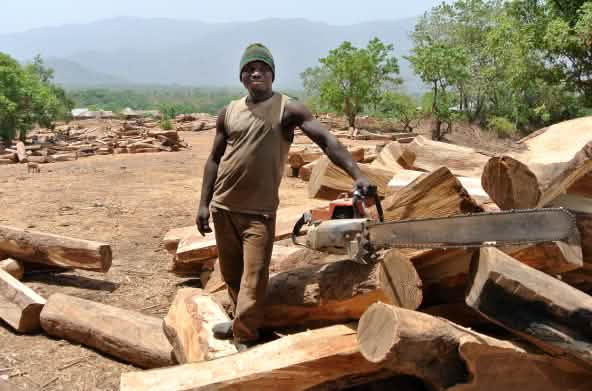Completed campaign
No World Bank money for palm oil
The World Bank has been investing in palm oil for 45 years. During that period, palm oil production and demand have grown manifold. Palm oil plantations cause land conflicts, rainforest destruction and the death of orangutans. By 2009, the World Bank could no longer ignore the ongoing complaints. Funding for palm oil was suspended and a new palm oil policy was announced. Now, however, the World Bank seems keen to return to 'business as usual' as far as palm oil funding is concerned.
The World Bank has invested $2 billion into palm oil cultivation and use since 1965, at last half of it in Indonesia and Malaysia. Palm oil companies such as Wilmar International were regularly granted loans and development funds by the World Bank and the International Finance Corporation (IFC), a member of the World Bank Group.
Over the last 45 years, oil palm plantations have grown eightfold worldwide – 23-fold in Indonesia, according to the World Bank. The World Bank has financed 15 palm oil projects in Indonesia and boasts about the „successful establishment of 100,000 hectares of oil palm plantations“.
The impacts have been disastrous: Oil palm expansion is the main cause of hundreds of, often violent land conflicts, rainforest destruction and species extinction in South-east Asia. Indigenous peoples have been desprived of their homes and livelihoods for palm oil. Thousands of orangutans are being killed as rainforest is cut and burned down for plantations. In Africa and Latin America, too, people and nature are suffering as a result of fast expanding, export-oriented oil palm plantations.
Last year, the World Bank could no longer ignore the complaints: In August 2009, World Bank President Robert Zoellick suspended all palm oil funding and announced a comprehensive palm oil strategy. Now, however, the World Bank seems determined to go back to 'business as usual'.
The new World Bank Draft Framework for Palm Oil is a farce. The World Bank claims to want to promote 'sustainable' palm oil production, but the vast industrial plantations which they want to continue funding and the production of great quantities of palm oil for the global market can be neither enviornmentally nor socially sustainable. Palm oil production consumes vast quantities of energy, land, fertile soils and water.
RSPO certification cannot change this fact. Palm oil is now contained in ever more products, from food to cosmetics and cleaners and it is being increasingly used for biodiesel and in power stations. This disastrous development must be stopped. On 21st September, environmental and social campaigners worldwide marked the International Day Against Tree Monocultures. Together with the World Rainforest Movement, we are asking people to sign the letter below which will be sent to the World Bank.
See here our recent film report from Indonesia about rain forest destruction and human rights abuses by RSPO certified Wilmar International Ltd., the world's biggest palm oil company. The report also reveals that the Round Table on Sustainable Palm Oil (RSPO) and the label are pure greenwashing: The sustainability Lie - How the palm oil industry is deceiving the world.
To:
- Robert Zoellick, World Bank President, Washington D.C., president@worldbank.org
- Lars H. Thunell, Executive Vice-Precident and CEO of the International Finance Corporation (IFC), lthunell@ifc.org, palmoilstrategy@ifc.org
- Susanna Moorehead, UK Executive Director,smoorehead@worldbank.org
- Ian Solomon, US Executive Director, iansolomon@worldbank.org
Dear Mr Zoellick, Mr Thunell, Ms Moorehead, Mr Solomon,
21st September is 'International Day Against Tree Monocultures'. On this day, we are calling on you to end World Bank funding for the palm oil industry for good. Industrial oil palm plantations are not and never can be sustainable.
The World Bank moratorium on palm oil funding, which was put in place last year, was a step in the right direction, albeit long over-due. The World Bank Draft Framework for Palm Oil, published at the end of July, on the other hand, is a wrong and dangerous move. It does not solve any of the problems and ignores the demands of affected people, amongst them forest-dependent peoples.
The World Bank wrongly assumes that the production of vast quantities of palm oil for the global market can be done 'sustainably'. In reality, however, vast industrial plantations can be neither enviornmentally nor socially sustainable. Certification, such as the RSPO, cannot solve those problems; instead it is being used by the industry to greenwash ongoing plantation expansion at the expense of rainforests and people.
Palm oil production threatens people and biodiversity in rainforest countries and consumes vast quantities of precious resources – energy, land, fertile soils and freshwater. There is no 'spare land' for oil palm expansion that is neither covered in rainforest and other ecosystem nor home to communities. Rainforests and peatswamps continue to be cleared for oil palm plantations and people continue being evicted. Governments continue to grant concessions to palm oil companies while refusing to give land titles to local communities, thus violating their human rights.
Small farmers tend to lose out in the industry-dominated palm oil nbusiness. Far more people lose their livelihoods as a result of plantation expansion than the number of jobs created by the palm oil industry. Smallholders struggle to survive the market and price fluctuations which are dictated by the global market, regardless of government support.
Important ecosystems and biodviersity are being wiped out for oil palm plantations and the water cycle is disrupted. Deforestation leads to more frequent and severe droughts and flooding. Large quanitites of herbicides and pesticides which are used on plantations poison soils and water.
At the same time, the global demand for palm oil continues to be increased – for food, cosmetics and biofuels. Those disastrous developments must be stopped.
In May this year, 108 human rights and environmental organisations worldwide as well as 16,000 individuals wrote to you to demand 'No more funding for oil palm plantations“. (http://www.wrm.org.uy/bulletin/154/World_Bank.html ).
Yours faithfully,

